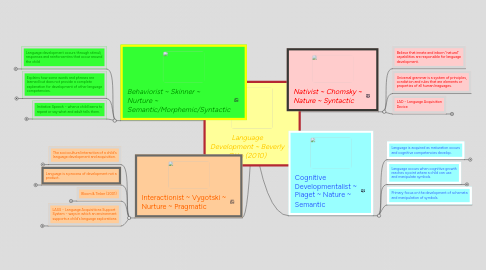
1. Interactionist ~ Vygotski ~ Nurture ~ Pragmatic
1.1. The sociocultural interaction of a child's language development and acquisition.
1.1.1. acquire language through attempts oto communicate with the world around them
1.1.2. Pragmatic language knowledge understanding
1.1.3. Language is acquired out of the need to function in society.
1.2. Language is a process of development not a product.
1.2.1. Vygotsky emphasized the rold of social interaction in language development.
1.2.2. Influenced by society in which child lives "higher mental functionns are socially formed and culturally transmitted."
1.3. Bloom & Tinker (2001)
1.3.1. child is an active learner
1.3.2. intentionality model of language development
1.3.2.1. active engagement with others and environment
1.3.2.2. effort of learner to make sense of language in their enviroment.
1.3.2.3. linguist...emotional...physical actions
1.3.3. Primary role of social interaction in language development based on ovservation that child acqires an awareness of specific communicative functions or intentions before they are able to express themselves linguistically.
1.4. LASS ~ Language Acquisitions Support System ~ ways in which an environment supports a child's language explorations
1.4.1. Present in interaction patterns found in converstations i.e Listening, responding, repeating and asking questions
2. Behaviorist ~ Skinner ~ Nurture ~ Semantic/Morphemic/Syntactic
2.1. Language development occurs through stimuli, responses and reinforcemtns that occur around the child
2.1.1. Operant conditioning ~ positive and negative reinforcement
2.1.1.1. the repetition of a favorable word or words when given praise
2.1.1.1.1. ma-ma/da-da
2.1.1.2. less use or discontinued use of unfavorable words or phrase when reprimanded
2.1.1.2.1. Explitive or misuse of
2.2. Explains how some words and phrases are learned but does not provide a complete explanation for development of other language competencies.
2.2.1. how a child learns to invent their own woeds or phrases not used by others around them.
2.3. Imitative Speech ~ when a child learns to repeat or say what and adult tells them.
2.3.1. "Now say "ma-ma"
3. Nativist ~ Chomsky ~ Nature ~ Syntactic
3.1. Believe that innate and inborn "natural" capabilities are responsible for language development.
3.2. Universal grammar is a system of principles, condistion and rules that are elements or properties of all human lnaguages.
3.3. LAD ~ Language Acquisition Device
3.3.1. children learn languuage by discovering the structur of their language
3.3.2. aided by a "natural" or inborn mechinish that is specific for language learning
3.3.3. enables children to process and acquire language through innate knowledge of grammatical classes, underlying deep structure and ways language can be manipulated.
4. Cognitive Developmentalist ~ Piaget ~ Nature ~ Semantic
4.1. Language is acquired as maturation occurs and cognitive competencies develop.
4.1.1. Cognitive development is a "prerequitsite and foundation for language development"
4.1.2. For language to occur, cognitive development must occur first.
4.2. Language occurs when cognitive growth reaches a point where a child can use and manipulate symbols.
4.2.1. Babbling at infancy is not considered language develoment.
